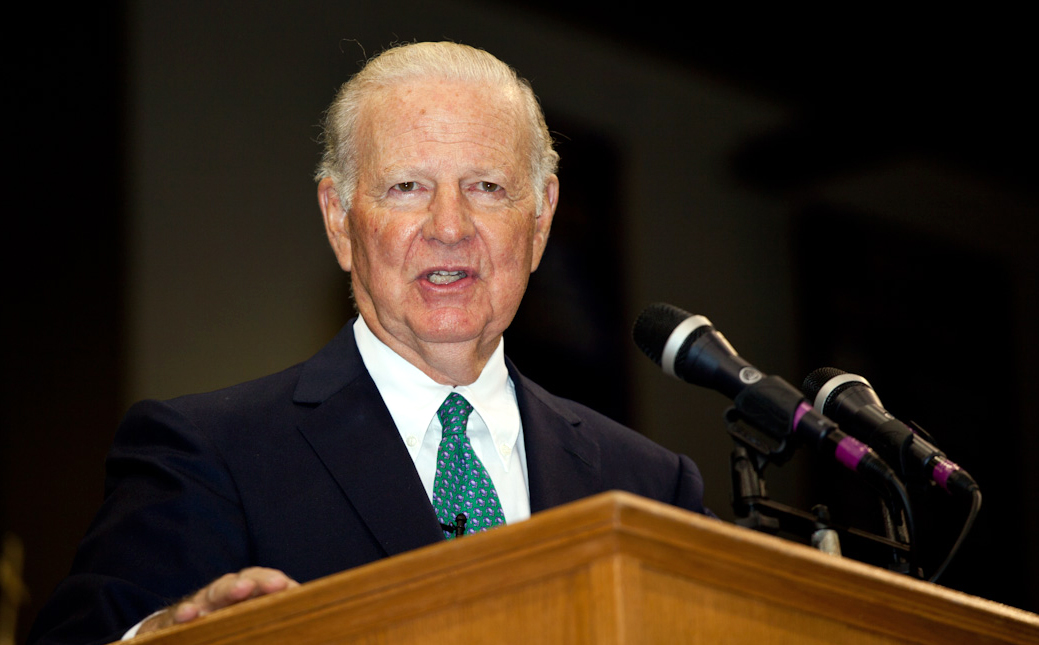Among the world’s most respected voices in oceanography and environmental science, D. James Baker has dedicated his life to understanding the planet’s oceans and promoting sustainable solutions to climate challenges. Known for his leadership at the National Oceanic and Atmospheric Administration (NOAA) and his groundbreaking scientific work, Baker stands as a pioneer who bridged academic research, government service, and global environmental advocacy.
Quick Bio
| Full Name | D. James Baker |
|---|---|
| Date of Birth | 1937 |
| Place of Birth | Pittsburgh, Pennsylvania, USA |
| Nationality | American |
| Occupation | Scientist, Oceanographer, Administrator |
| Fields of Expertise | Oceanography, Climate Science, Environmental Policy |
| Education | B.A. Physics (Princeton University); Ph.D. Physics (Cornell University) |
| Known For | Former NOAA Administrator; Leadership in Global Climate Programs |
| Institutions Affiliated With | NOAA, University of Washington, Woodrow Wilson Center |
| Years Active | 1960s – Present |
| Spouse / Family | Married – Private Life |
Early Life and Background

Born in Pittsburgh, Pennsylvania in 1937, D. James Baker grew up during a time when scientific curiosity was rapidly reshaping the modern world. His early exposure to physics, nature, and technology fueled a deep fascination with how the Earth’s systems function. Encouraged by supportive parents who valued education, Baker developed an analytical mind and a passion for exploration.
As a child, he spent much of his time reading about astronomy and ocean currents, intrigued by how invisible forces shaped both the sky and the sea. These early interests would ultimately inspire a lifelong pursuit to decode the science of the planet’s most complex ecosystem — the ocean.
Education and Academic Development

D. James Baker began his formal education in physics at Princeton University, where his academic performance stood out for both precision and creativity. After completing his undergraduate degree, he pursued a Ph.D. in Physics at Cornell University, one of the nation’s most prestigious research institutions.
At Cornell, Baker focused on fluid dynamics and physical systems, work that would later prove essential in understanding oceanic motion and energy exchange. His mentors encouraged him to combine physics with environmental studies, inspiring his eventual transition into physical oceanography — a field that merges mathematics, meteorology, and geophysics to explain how oceans regulate Earth’s climate.
This academic foundation gave Baker the technical depth and interdisciplinary mindset that would define his distinguished career.
Early Career and Research Beginnings

After earning his doctorate, D. James Baker accepted a teaching and research position at the University of Washington, one of the leading centers for ocean studies in the United States. His early research examined the physics of ocean currents, heat transfer, and how the oceans influence global weather systems.
During this time, Baker became one of the first scientists to advocate for using satellite data to study ocean temperature and circulation — an idea that was revolutionary in the 1960s and 1970s. His ability to merge theoretical physics with practical environmental applications marked the beginning of his transformation from academic researcher to public science leader.
Scientific Contributions and Discoveries
Throughout his career, D. James Baker has made major contributions to physical oceanography and climate science. His studies on ocean circulation and energy transfer helped build the foundation for modern climate modeling.
Baker’s work provided valuable insights into the interaction between the oceans and the atmosphere, clarifying how changes in sea surface temperature affect global weather patterns like El Niño and La Niña. His research also influenced early discussions on the role of carbon absorption in ocean ecosystems, linking oceanography directly to the study of global warming.
By translating complex ocean data into actionable environmental policy, Baker became a bridge between scientific discovery and public understanding.
Leadership Roles and Administrative Career
D. James Baker is best known for his tenure as Administrator of the National Oceanic and Atmospheric Administration (NOAA) from 1993 to 2001 under President Bill Clinton. During this period, he oversaw national programs for weather forecasting, climate research, and ocean conservation.
At NOAA, Baker championed the modernization of satellite and data systems used for climate monitoring, greatly improving the accuracy of environmental prediction models. He also launched initiatives to strengthen international cooperation on climate change, positioning NOAA as a global leader in environmental science.
His administration emphasized transparency, interdisciplinary research, and the need for science-based policymaking — principles that remain central to NOAA’s mission today.
Role in Environmental Advocacy and Policy
Beyond government service, D. James Baker has remained one of the world’s strongest advocates for sustainable development and climate responsibility. After leaving NOAA, he continued his work with organizations such as the Woodrow Wilson Center and the Global Carbon Measurement Program, promoting the use of scientific data to guide environmental decision-making.
He has advised governments, universities, and corporations on how to integrate environmental science into policy and practice. His philosophy is simple yet profound: that scientific understanding must lead to actionable solutions that protect both ecosystems and economies.
Baker’s advocacy helped shape early frameworks for carbon accounting, marine protection, and climate resilience strategies adopted around the world.
Teaching and Mentorship
In addition to his administrative and research achievements, D. James Baker has left an enduring mark as an educator. As a professor at the University of Washington and other institutions, he mentored generations of scientists who would go on to lead in oceanography, climate modeling, and environmental management.
His teaching philosophy emphasized curiosity, collaboration, and ethical responsibility. Students and colleagues remember him as both intellectually demanding and deeply supportive, encouraging innovative thinking and public service. His mentorship continues to influence the scientific community, reminding future leaders that effective science requires both rigor and compassion.
Age and Physical Appearance
Now in his mid-eighties, D. James Baker continues to embody the calm authority of a lifelong scientist. He is known for his composed demeanor, reflective tone, and steady presence during interviews and conferences.
With a professional yet approachable style, Baker often appears in simple attire, focusing attention not on himself but on the message of sustainability he promotes. His gentle humor and thoughtful articulation have made him a respected figure across both scientific and public audiences — a man whose appearance mirrors his intellectual depth and modest personality.
Relationships and Family Life
While D. James Baker keeps much of his personal life private, it is known that he values family and community deeply. His long marriage and close family relationships have been a cornerstone of his stability and perspective throughout decades of public service.
He often acknowledges that his family’s encouragement allowed him to pursue demanding leadership roles without losing sight of balance and personal well-being. Those who know him describe him as warm, patient, and grounded — qualities that complement his analytical brilliance.
Awards, Honors, and Recognition
Over the course of his distinguished career, D. James Baker has received numerous awards recognizing his contributions to science and policy. Among them are honors from the American Meteorological Society, the National Academy of Engineering, and international environmental organizations.
He has been celebrated for advancing climate modeling, sustainable policy integration, and international ocean cooperation. His leadership at NOAA earned him widespread respect within both the scientific community and government institutions.
These awards reflect not only his research achievements but also his ability to translate science into meaningful, real-world impact.
Current Work and Legacy
Even after decades of public service, D. James Baker remains active in the environmental field. He continues to advise international initiatives on climate measurement and marine policy, ensuring that accurate data guides global sustainability goals.
His legacy lies in the systems he helped build — satellite networks, research collaborations, and climate databases that form the backbone of modern environmental monitoring. Through his lifelong work, Baker has proven that science can lead policy and that informed leadership can protect the planet for future generations.
Conclusion
D. James Baker stands as one of the great figures in modern environmental science. From his early fascination with physics to his leadership at NOAA and his enduring influence in climate policy, his journey reflects a rare blend of intellect, integrity, and vision.
He has shown that understanding the ocean means understanding the Earth itself — a philosophy that continues to guide scientists and policymakers alike. As the planet faces unprecedented environmental challenges, Baker’s life serves as an inspiring reminder that knowledge, when combined with purpose, can safeguard the world we share.
FAQs
Who is D. James Baker?
D. James Baker is an American scientist and oceanographer known for his leadership at the National Oceanic and Atmospheric Administration (NOAA).
What is D. James Baker known for?
He is recognized for advancing climate science, oceanography, and environmental policy, shaping global sustainability efforts.
When did D. James Baker lead NOAA?
He served as Administrator of NOAA from 1993 to 2001 under President Bill Clinton, modernizing climate and ocean programs.
Where did D. James Baker study?
He studied physics at Princeton University and earned his Ph.D. in physics from Cornell University.
What were D. James Baker’s key scientific contributions?
His research on ocean circulation, climate modeling, and marine ecosystems transformed modern environmental science.
What positions has D. James Baker held?
He has worked as a professor, NOAA Administrator, and advisor to global environmental organizations.
What is D. James Baker’s focus today?
He continues to promote climate action, data-driven policy, and sustainable resource management worldwide.
Has D. James Baker received awards?
Yes, he has earned several scientific and public service honors for his contributions to ocean and climate research.
What is D. James Baker’s legacy?
He is regarded as a pioneer in oceanography and a leading voice in using science for environmental stewardship.
Why is D. James Baker important?
His life’s work connects scientific innovation with policy, helping to protect the planet through informed global action.
Visit For More Information Go To entrepreneurideas
